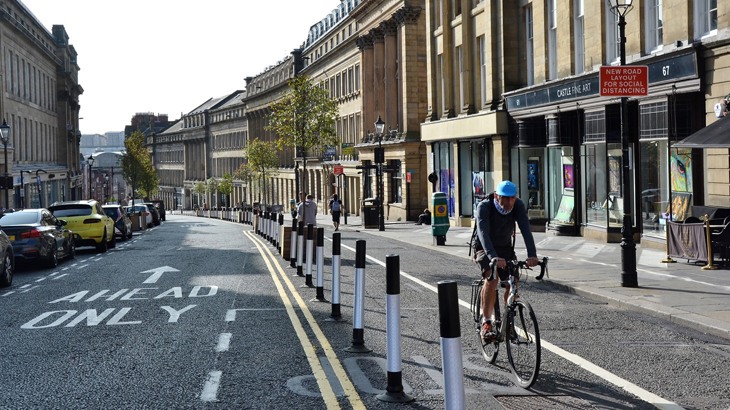The UK’s leading walking and cycling organisations are backing plans to get more people walking and cycling, as the Government today (13 November) announces the second round of its Active Travel Fund.

© Crispin Hughes
The Walking and Cycling Alliance, comprising Bicycle Association, British Cycling, Cycling UK, Living Streets, Sustrans and the Ramblers, sets out the urgent case for Low Traffic Neighbourhoods.
The alliance also uses evidence and case studies from across the country to tackle the urban myths that have emerged around them.
About the report
The report brings together leading voices in the active travel movement, including Chris Boardman and former Shadow Secretary of State for Transport, Mary Creagh.
It answers the frequently asked questions about congestion, and perceived effects on business, emergency services and local consultation.
Funding provided so far
In May, the government announced a £225m emergency active travel fund for councils in England to encourage people to adopt healthier travel habits, help social distancing and prevent traffic congestion.
Funding was also made available by the Scottish and Welsh Governments to councils to implement walking and cycling measures.
Tranche 1 was for temporary Covid related measures, whilst today’s tranche 2, which amounts to £175m, is for longer-term projects that provide safe spaces for people to walk, cycle and wheel.
Building back better after Covid-19
Speaking on behalf of the Walking and Cycling Alliance, Mary Creagh, CEO, Living Streets said:
"Everyone should feel safe to walk, cycle, wheel or scoot on our streets, but that is not the case in too many towns and cities.
"Across the country, there is a silent majority in favour of more people-friendly streets, but all too often their voices are drowned out by a vocal minority.
"It’s vital more people start walking and cycling for local journeys, to reduce congestion, improve air quality and tackle the twin epidemics of loneliness and obesity.
"We hope this report will support councillors to build back better after the pandemic."

Local authorities need to continue to make it easier for people to walk and cycle.
An urgent need for more space to walk and cycle
Daisy Narayanan, Director of Urbanism at Sustrans, the walking and cycling charity said:
“The Covid-19 crisis created a need to change the way we move around in our towns and cities, with walking and cycling being seen as one of the safest modes of transport during the pandemic.
"This urgency to designate more space for walking and cycling has naturally created opposition as change can be difficult for people, especially during a time of crisis.
Part of the solution to tackle climate change
Daisy continues:
"There is however overall public support for action to be taken to make it easier to walk, wheel and cycle around our towns and cities.
"Our latest YouGov poll shows that seven in ten (71%) UK parents agree that local authorities should take steps to make it easier for families to travel actively to school.
"Local authorities, therefore, need to continue to make it easier for people to walk and cycle.
"And the Tranche 2 funding is a huge opportunity to progress the work that has already begun, and create safer, healthier and truly inclusive streets and places.
"This is also a vital part of the solution to meet governmental climate change targets.
“Organisations like Sustrans are here to help and share our expertise with local authorities, whether it is engagement with communities or putting schemes in place.”





